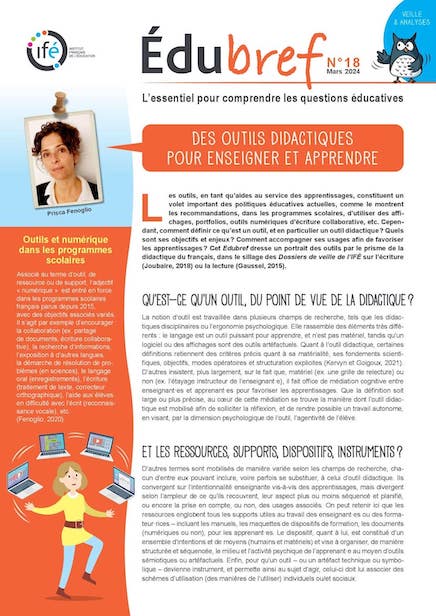La méthode de la "classe puzzle" est-elle efficace pour améliorer l'apprentissage ?
Auteur(s) : STANCZAK Arnaud
Date de soutenance : 2020
Thèse délivrée par : Université Clermont-Auvergne
Section(s) CNU : section 16 : Psychologie, psychologie clinique, psychologie sociale
Sous la direction de : Céline DARNON & Pascal HUGUET
Jury de thèse : Céline DARNON ; Pascal HUGUET ; Céline BUCHS ; Fabrizio BUTERA ; Benoît GALAND ; Isabelle REGNER
"Ce travail de recherche a pour objectif de tester les effets de la classe puzzle, ou « Jigsaw classroom », sur les apprentissages. La méthode Jigsaw est une pédagogie coopérative créée par Aronson et collaborateurs dans les années 1970, afin de favoriser l’inclusion des minorités ethniques (e‧g, Mexicain·es et Afro-Américain·es) dans les écoles nouvellement désegréguées. Selon la théorie de l’interdépendance sociale les effets positifs de l’apprentissage coopératif dépendent de la structuration des interactions entre individus (Deutsch, 1949 ; Johnson & Johnson, 1989). Dans Jigsaw, la structuration de cette interdépendance provient essentiellement de la distribution de ressources complémentaires : chaque individu dispose d’une « pièce du puzzle » à reconstituer à l’aide des autres membres du groupe. La coordination des efforts entre membres devrait amener ces dernier‧es à mettre en place des interactions facilitatrices (e‧g., comportements d’entraide, explications et questionnements) et aboutir à un meilleur apprentissage. Toutefois, bien que cette méthode soit présentée par ses concepteur·rices comme un outil efficace pour améliorer l’apprentissage des élèves, les preuves empiriques tendent à manquer. Dans cette thèse, l’efficacité de Jigsaw sera questionnée à travers une analyse de la littérature scientifique, ainsi qu’une méta-analyse sur les travaux récents et un ensemble d’études expérimentales menées auprès d’élèves de sixième. À notre connaissance, bien que certaines recherches testant les effets de Jigsaw soient compilées dans des méta-analyses (Kyndt et al., 2013), il n’existe pas à ce jour de méta-analyses testant spécifiquement les effets de Jigsaw sur les apprentissages. À travers six chapitres, nous tenterons d’apporter des éléments permettant d’évaluer l’efficacité de la méthode Jigsaw sur les apprentissages. "
Is the "Jigsaw classroom" method efficient to improve learning ?
"The objective of this thesis is to test the effect of the Jigsaw classroom on learning. The Jigsaw classroom is a cooperative technique created by Aronson and his colleagues in the 1970s to promote the inclusion of ethnic minorities (e‧g., Mexican and African-American) in desegregated schools. Although this method is presented by its developers as an effective tool for improving student learning, empirical evidence is lacking. According to the social interdependence theory, the structure of interactions between individuals determine the effects of cooperative learning (Deutsch, 1949; Johnson & Johnson, 1989). In Jigsaw, this structure comes from the distribution of complementary resources: each individual owns a “jigsaw piece”, namely a piece of information which requires the coordination of efforts among members to answer a problematic. With the help of other group members, promotive interactions (e‧g., helping behaviors, explanations and questioning) should emerge which results in a better learning for the members.In this thesis, Jigsaw's effectiveness will be evaluated through a review of the scientific literature, as well as a meta-analysis of recent research and a set of experimental studies conducted among french sixth graders. To our knowledge, the experimental study of Jigsaw’s effects on learning in student populations is almost non-existent in the scientific literature and even though some research testing these effects is compiled in meta-analyses (Kyndt et al., 2013), there are no meta-analyses to date that specifficaly adress the question of Jigsaw's effects on learning. Hence, the research presented in this manuscript will attempt to evaluate the effectiveness of the Jigsaw method on learning. In Chapter 1, we present “social interdependence theory” (Johnson & Johnson, 1989, 2002, 2005), several definitions and ways of structuring cooperation between students, as well as a review of their effects on learning. Chapter 2 examines one of these cooperative technique in detail: Jigsaw (Aronson et al., 1978; Aronson & Patnoe, 2011). We describe the evolution of empirical studies conducted from its conception to the present day. Chapter 3 points out some of the limitations of this literature, particularly in terms of statistical power, and the impacts it may have on the estimation of Jigsaw's effectiveness on learning. We also develop our main hypothesis, its operationalization and the statistical tools and procedures we use in the empirical chapters: equivalence tests (Lakens, 2017), smallest effect size of interest (Hattie, 2009) and meta-analyses (Borenstein et al., 2010; Goh et al., 2016). Chapter 4 presents the results of a meta-analysis of Jigsaw's effects on learning, which synthesized empirical articles published between 2000 and 2020. We test several moderators (e‧g., grade level, discipline, type of Jigsaw, location of research) in order to quantify the dispersion of Jigsaw effects and to assess heterogeneity between studies. Chapter 5 compiles five studies conducted among french sixth graders in which we test the effectiveness of Jigsaw on learning, compared to an “individual” (studies 1 and 2) or a “teaching as usual’ condition (studies 3A, 3B and 3C). The results of this chapter are interpreted with regard to the meta-analysis and the debates related to the structure of Jigsaw. In the last chapter of this manuscript, we summarize the main results developed trough the theoretical and empirical chapters. The contributions and limitations of our research are developed, as well as theoretical and practical perspectives to overcome them in view of future research. "
URL : https://tel.archives-ouvertes.fr/tel-03170791/document
mot(s) clé(s) : pratiques pédagogiques, psychologie de l'éducation














